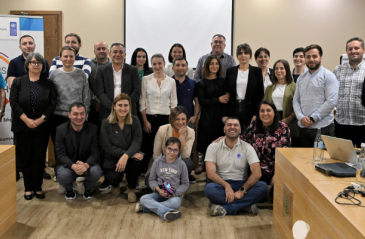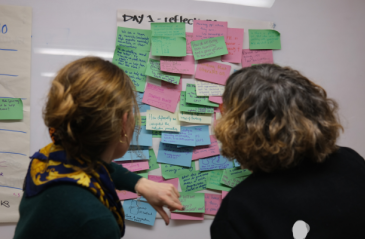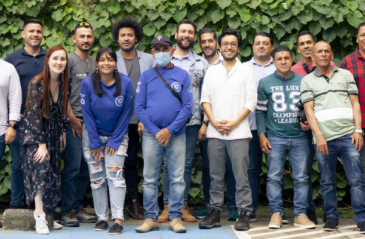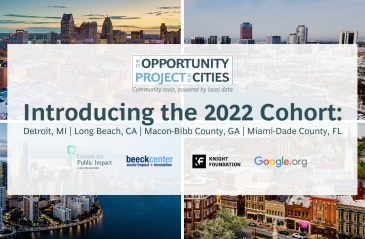
Learnings from Urban Imaginaries – Georgia

Nigeria's economy has not proved immune to global challenges
Share articleNear-term progress is best achieved by improving government regulations and digital technology
Share articleNigeria’s infrastructure is in many ways the country’s greatest challenge
Share articleWe put our vision for government into practice through learning partner projects that align with our values and help reimagine government so that it works for everyone.
Rich natural resources? Tick. Arable land? Tick. Free-market economy? Tick. Africa's largest economy? Tick. Young, entrepreneurial population? Tick. Nigeria, it would appear, has everything a country needs for it to take some giant strides forward. So, what's the problem?
Unfortunately, the economy - which has grown substantially in recent years - has not proved immune to global challenges. Low oil prices that have impacted countries worldwide, for example, have sent the naira plummeting and could lead to a serious economic slowdown. And other, more longstanding problems - such as poor governance, corruption, widespread poverty (82% of the population live on less than $2 a day), and inadequate infrastructure - remain front of mind.
Addressing these challenges will not happen overnight - but it can be done. To help chart a route forward we have placed Nigeria under the The Boston Consulting Group's Sustainable Economic Development Assessment (SEDA) microscope. SEDA - a diagnostic tool designed to provide insight into the well-being of a country's citizens and how effectively a country converts wealth, as measured by income levels, into well-being - has uncovered some interesting insights, starting with governance and civil society.
That there is a strong correlation between governance and civil society should come as little surprise. Strength in civil society - which includes factors such as civic activism and personal safety - is likely to have a positive impact on factors such as political stability and the rule of law.
Near-term progress is best achieved via two powerful levers. Firstly, improve government regulations, such as reforming Nigeria's oil subsidy scheme. Currently, the Nigerian government is not making oil subsidy payments because low oil prices have driven the price Nigerians pay for petrol below the subsidy price. The government should take advantage of this to formally end the subsidy system.
The second is by deploying digital technologies in government more extensively. Policymakers worldwide have made progress in how they use technology but there remains more to do. In Nigeria, the transformation of the country's national pension fund system highlights what can be achieved. Under the old system, it often took years for retired employees to receive their pensions - if they received them at all. The new digital system gives Nigerians increased visibility into and control of their pensions.
Nigeria's infrastructure is in many ways the country's greatest challenge. Only 56% of Nigerians have access to electricity and the country's road network is also weak, with just 0.21 kilometres of roads per square kilometre. Throw in that only about 30% of the population has access to sanitation facilities that meet certain hygiene standards, and just 64% has access to drinkable water, the scale of the problem becomes clear. Studies show that Nigeria will need to invest about $3 trillion in infrastructure over the next 30 years, or roughly $100 billion a year. The upshot is that it will be critical to attract substantial outside investment in the form of public-private partnerships.
To do so, policymakers need to start by creating a central governing body with representatives from multiple stakeholders, including state and federal government. This body should appoint an executive group to manage infrastructure projects throughout their life cycle. This group should select ten landmark infrastructure projects that can be executed rapidly in order to generate early wins.
They should also take an aggressive role in building connections with private investors. This includes developing a list of potential investors, such as sovereign funds, development finance institutions, and institutional investors. And with the 10 initial projects under way, the governing body should develop a long-range plan involving another 50 or so projects. Given the dire state of Nigeria's infrastructure, the push for investment must continue for at least a decade.
With enrolment rates low and armed conflicts in some parts of the country preventing many children from attending school, there is much room for improvement when it comes to Nigeria's education system. For starters, a standard curriculum should be developed for all Nigerian primary and secondary schools, both public and private. Setting clear, measurable goals and tracking results is crucial.
The government can also boost enrolment by creating financial incentives for low-income families to take their children to school. Steps should also be taken to expand the size and quality of the teaching workforce, and at the same time, creating an education system that meets the demands of the job market must involve increasing the supply of workers with vocational and technical training.
There is better news in the health sector: between 2000 to 2015 life expectancy increased by eight years and child mortality decreased by 40%. But because efforts to improve health issues have tended to be reactive rather than proactive, the country faces serious challenges in a number of critical areas. For example, child and infant mortality rates are still among the highest in the world.
Nigeria can improve its health system by going back to basics. By this we mean zeroing in on critical issues in the broader health ecosystem, such as sanitation, access to clean water, nutrition, and road and work safety. The country should also develop a system of primary health care centres that focus on disease prevention, early diagnosis, and treatment, thus easing the pressure on crowded hospitals.
So much for the wish list, what's most important is making meaningful improvement - which can be particularly challenging in developing countries like Nigeria, where constraints such as a lack of expertise in project implementation and a lack of accountability among ministries can hinder progress. And in Nigeria, the challenges are compounded by the fact that policies and plans are developed at the federal level but need to be implemented at the state level.
Overcoming these barriers requires policymakers to set clear priorities, move quickly, and keep it simple. They also need to focus resources on these priorities and monitor implementation closely. Doing so will require better links between implementers and decision makers, and quick wins to build early momentum. Leaders of reform need to make sure that their message is clear and unequivocal, and is communicated effectively to government workers and private citizens. And the government also needs to develop strategic partnerships with the private sector, donor organizations, and development finance institutions.
This may sound like a daunting directory of requirements but there should be no apology for aiming high. The 170 million people who live and work in this magnificent country deserve nothing else. Unleashing their energy and drive, and delivering real improvements in infrastructure, health and education, will achieve a public impact that will ripple across the African continent and beyond - and in doing so raise the well-being of all Nigerians to fresh heights.
Now there's an ambition to inspire the journey ahead.









